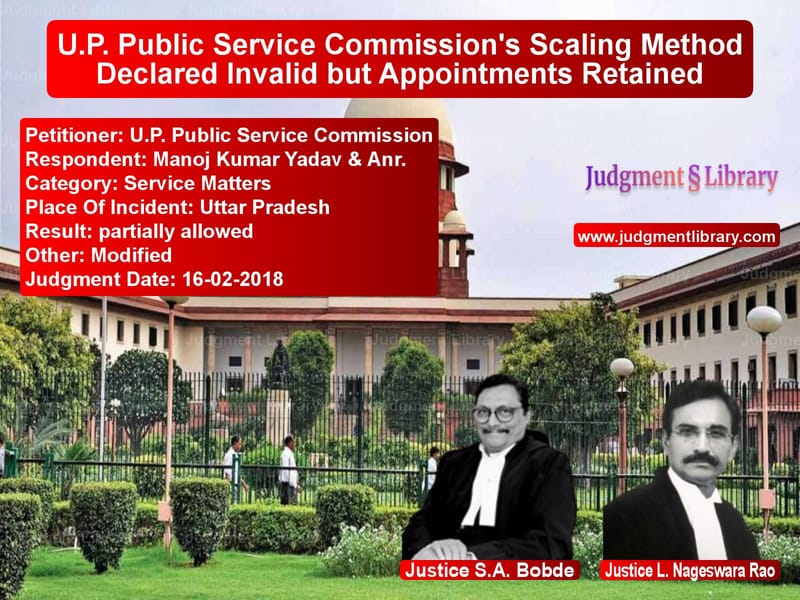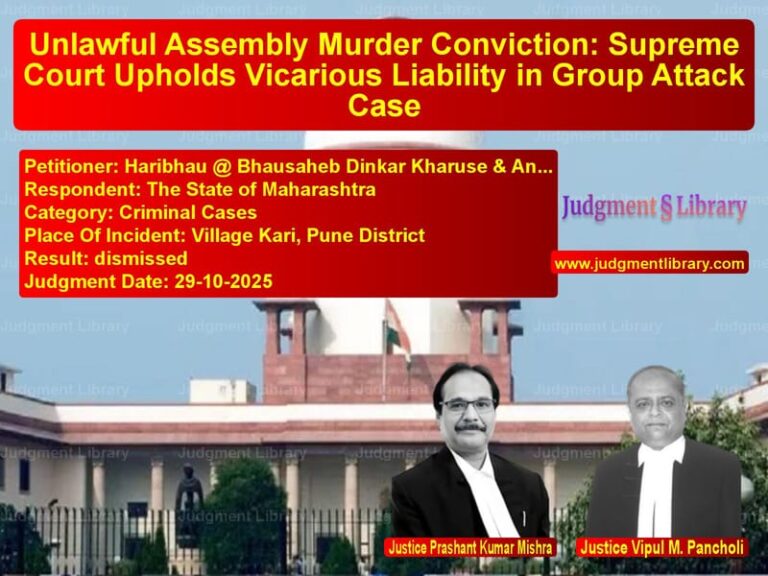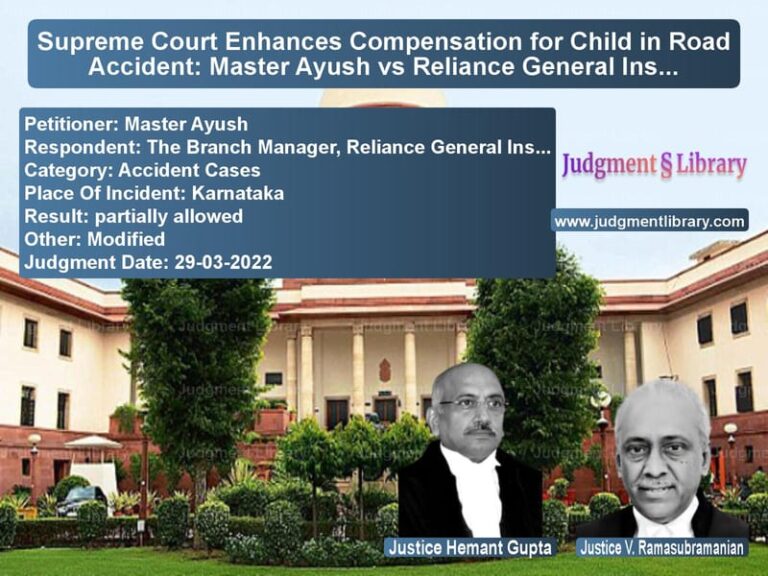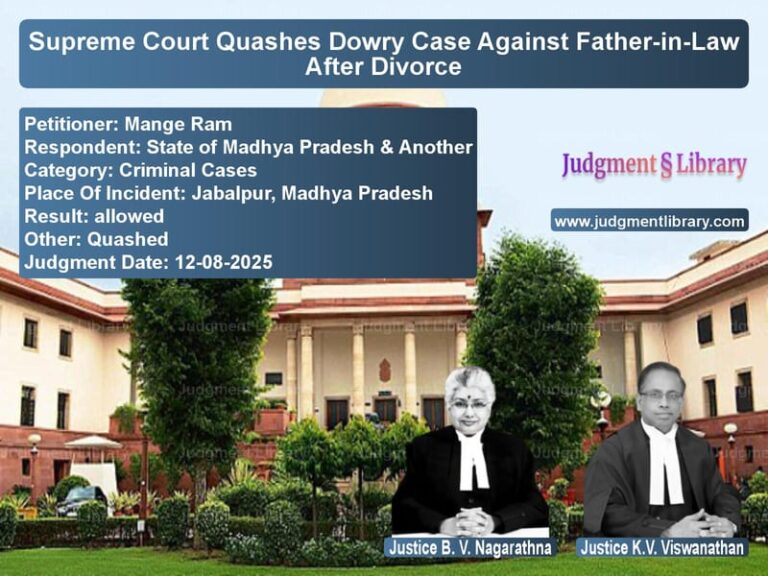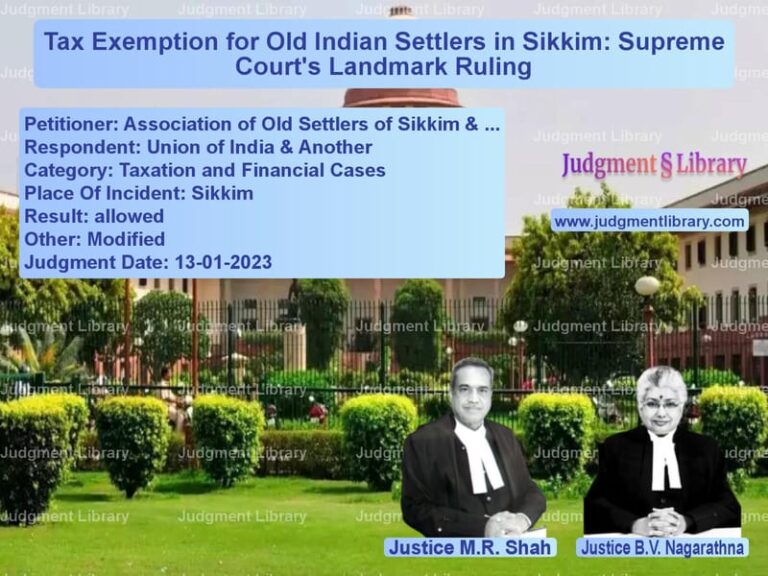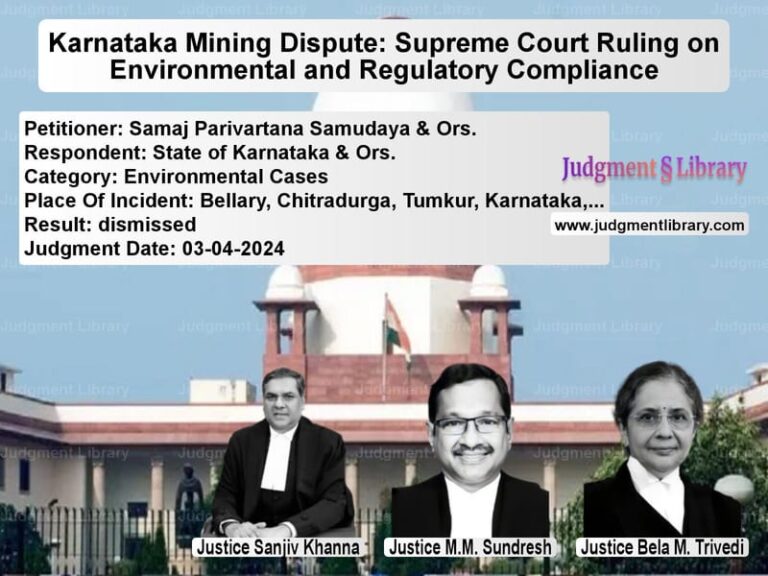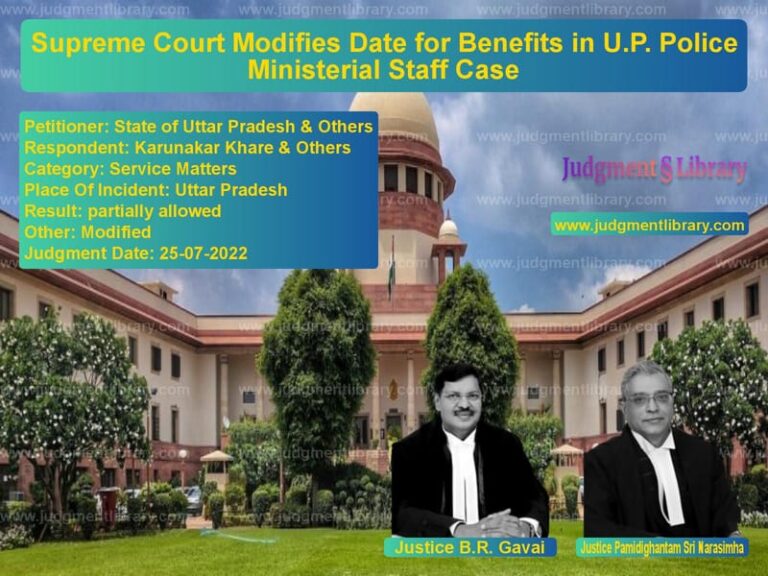U.P. Public Service Commission’s Scaling Method Declared Invalid but Appointments Retained
The Supreme Court of India recently ruled in U.P. Public Service Commission v. Manoj Kumar Yadav & Anr., addressing the legality of the scaling method adopted in the recruitment process for the Provincial Civil Services (P.C.S.) Examination, 2004, and the Combined State/Upper Subordinate Services Backlog/Special Recruitment Examination, 2004. While the Court upheld the High Court’s decision that the scaling method was arbitrary, it declined to cancel the appointments of selected candidates, considering the passage of time and their long-standing service.
Background of the Case
The U.P. Public Service Commission (UPPSC) conducted recruitment exams in 2004 for filling various civil service posts. The recruitment included two separate examinations:
- P.C.S. Examination, 2004: For general recruitment.
- Backlog Examination, 2004: Special recruitment for reserved category candidates.
The examinations consisted of:
- A preliminary examination.
- A main written examination with compulsory subjects (General Studies, Hindi, and English Essay) and optional subjects (two chosen from 33 available options).
- An interview process.
The scaling method, a statistical tool used to equalize variations in marking across different subjects, was applied to both the compulsory and optional subjects. However, this method led to significant variations in marks, resulting in a legal challenge by candidates who alleged that the process was arbitrary and unfair.
Legal Challenge Before the High Court
A group of unsuccessful candidates filed writ petitions before the Allahabad High Court, arguing that:
- The scaling method distorted the actual scores of candidates, leading to unfair results.
- Applying scaling to compulsory subjects was contrary to previous rulings of the Supreme Court.
- The selection process was arbitrary, as it did not follow the legal precedent set in Sanjay Singh v. U.P. Public Service Commission (2007), where the Supreme Court had invalidated the scaling method for similar exams.
The High Court, in its judgment dated May 25, 2007, quashed the results of both examinations and directed UPPSC to declare fresh results without applying the scaling method.
Appeal to the Supreme Court
UPPSC challenged the High Court’s decision before the Supreme Court, arguing:
- The scaling method was applied based on expert advice and had been used in prior examinations.
- The Supreme Court’s ruling in Sanjay Singh pertained to a different type of exam and did not directly apply to the P.C.S. Examination.
- The results had already been declared, and appointments were made under the Supreme Court’s interim stay order.
- Revising the results now would unfairly affect selected candidates who had been working for more than a decade.
Supreme Court’s Analysis
1. Scaling Method Declared Invalid
The Supreme Court agreed with the High Court that the application of the scaling method to compulsory subjects was improper. The judgment noted:
“The scaling method can only be used for optional subjects where different papers are evaluated by different examiners. However, applying scaling to compulsory subjects, which are common to all candidates, is contrary to our ruling in Sanjay Singh.”
2. Appointments Should Not Be Cancelled
While acknowledging the flaws in the selection process, the Court considered the consequences of canceling the appointments. It observed:
“The selected candidates have been working for over ten years based on an interim order passed by this Court. Revising the results now would cause unnecessary disruption and hardship.”
3. Future Exams Must Follow Proper Procedure
The Court directed that in future examinations, UPPSC must ensure that:
- Scaling is applied only to optional subjects.
- Compulsory subjects are evaluated without modification through statistical methods.
- Examinations follow the principles laid down in Sanjay Singh to prevent similar challenges.
Supreme Court’s Verdict
The Supreme Court disposed of the appeals with the following rulings:
- The application of the scaling method to compulsory subjects was invalid.
- The High Court’s direction to re-evaluate results was set aside.
- The existing appointments were allowed to continue.
- Future exams must follow the principles set in Sanjay Singh.
Implications of the Judgment
This ruling has far-reaching consequences for public service recruitment:
- Ensuring Fair Evaluation: The judgment reinforces that scaling cannot be arbitrarily applied, particularly to compulsory subjects.
- Judicial Balancing: By not disturbing existing appointments, the Court struck a balance between legal correctness and administrative stability.
- Guidance for Future Exams: Recruitment bodies must now ensure their evaluation methods comply with established legal principles.
- Prevention of Unnecessary Litigation: The ruling aims to prevent future disputes over examination results by clarifying the permissible use of scaling.
Conclusion
The Supreme Court’s decision in U.P. Public Service Commission v. Manoj Kumar Yadav & Anr. is a landmark ruling in public service recruitment law. By upholding the invalidity of the scaling method but allowing existing appointments to stand, the Court has ensured both fairness and administrative stability. This judgment serves as a crucial precedent for recruitment exams conducted by various state and central agencies across India.
Petitioner Name: U.P. Public Service CommissionRespondent Name: Manoj Kumar Yadav & Anr.Judgment By: Justice S.A. Bobde, Justice L. Nageswara RaoJudgment Date: 16-02-2018
Don’t miss out on the full details! Download the complete judgment in PDF format below and gain valuable insights instantly!
Download Judgment: U.P. Public Service vs Manoj Kumar Yadav & Supreme Court of India Judgment Dated 16-02-2018.pdf
Direct Downlaod Judgment: Direct downlaod this Judgment
See all petitions in Recruitment Policies
See all petitions in Public Sector Employees
See all petitions in Employment Disputes
See all petitions in Judgment by S. A. Bobde
See all petitions in Judgment by L. Nageswara Rao
See all petitions in partially allowed
See all petitions in Modified
See all petitions in supreme court of India judgments February 2018
See all petitions in 2018 judgments
See all posts in Service Matters Category
See all allowed petitions in Service Matters Category
See all Dismissed petitions in Service Matters Category
See all partially allowed petitions in Service Matters Category

